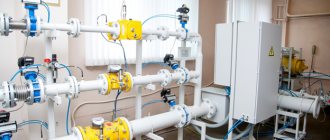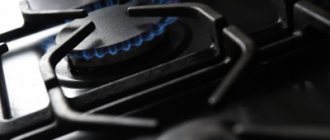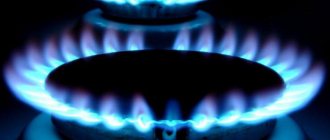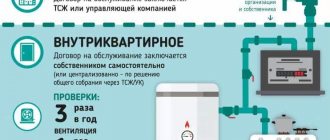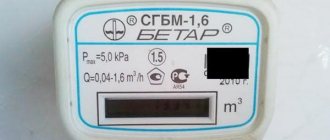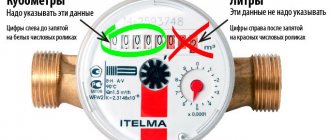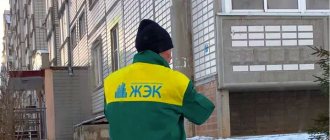A list of utility services that will be provided to the residents of the house and for which they agree to pay, tariffs for them are negotiated at the general meeting, when concluding an agreement with the Management Company.
And after establishing the list, both parties must fulfill their obligations. The Management Company, with the help of suppliers, provides the house with gas, water, heat, and the apartment owners pay for resources and maintenance work on the house.
Every month, a payment invoice arrives at the address of each apartment, in which there are many columns with the amount of payments, each column corresponds to a specific service. Consumers get used to the type of payment, and therefore they are always surprised and often with dissatisfaction when new columns appear on the rent receipt.
This is what the column with the abbreviation VDGO has recently become. What is this, what service is encrypted in these letters, do I need to pay for it?
Before you become indignant at the appearance of a new column, it is worth finding out what abbreviation decoding exists for the VDGO payment. After clarifying this issue, it will be clear that the service is not superfluous, it is important for the normal maintenance of equipment in an apartment building and each apartment.
How is it deciphered?
The appearance of this payment raises many questions among apartment building residents. What does this service refer to and what does it mean?
ATTENTION! VDGO is indoor gas equipment.
The letters TO, which denote maintenance, are often placed with this abbreviation. It becomes clear that the column in the rent payment invoice VDGO indicates the maintenance of gas equipment located and operated inside the house.
This is a whole complex of irreplaceable works on which the performance and reliability of the gas pipeline system depends. Everyone understands that gas supply in private houses and apartments means providing conditions for normal life and recreation, it means heat, food, hot water.
In-house gas equipment, even the newest ones, requires regular inspection, maintenance, checking for gas leaks and other problems. This is done by gas service workers, but their work must be paid accordingly.
And that’s why a new column appeared in the bills, the amount of which was previously simply included in the payment for gas supply.
Carry out diagnostics
It is necessary to check equipment that has expired its service life established by the manufacturer, or the time limits established by the design documentation approved for gas pipelines.
Diagnostics can be initiated for other equipment. This can be done by:
- performers under a contract for the maintenance and repair of gas equipment,
- gas supplier,
- gas distribution organization,
- GZhN bodies.
Diagnostic work is carried out by a specialized organization under a paid agreement on technical diagnostics. This agreement with a specialized organization is concluded by:
- for in-house gas equipment - the management organization, homeowners association or housing cooperative, or the owners of the premises with a direct management method;
- for indoor gas equipment - owners, users, tenants of premises.
Why carry out diagnostics? In order to determine the actual technical condition of gas equipment. To find faults and determine the period of possible further use of gas equipment.
A new circumstance has emerged for replacing gas equipment - upon expiration of the equipment service life established by the manufacturer or the terms established by the design documentation. If this period is extended after the diagnosis, then there is no need to change the equipment.
What applies to VDGO
Each apartment building is a complex structure, including not only apartments and common areas, but also engineering systems that ensure the supply of various resources to create proper living conditions.
Part of these systems is in-house gas equipment. This category includes a whole list of equipment:
- The pipeline runs from the place where it connects to the gas distribution network to the place where the shut-off valve is installed in the apartment.
- Household meter.
- Gas metering devices,
- Safety fittings.
- Control valves.
- Devices for measuring the amount of fuel.
This category also includes elements of gas equipment in private houses - the same pipes, the meter. It is supplemented by devices for using gas (this is a stove, a water heater, a boiler).
Along with the term VDGO, the term VKGO is used - indoor gas equipment. The group of indoor equipment includes gas stoves, boilers, and water heaters. This is also an IPU, control system, fittings.
The list of equipment that needs professional and responsible maintenance is quite large, and therefore requires a set. software and VKGO service. It is carried out on the basis of an agreement that must be concluded directly with the gas service or through the Management Company.
The maintenance agreement confirms the obligations of both parties to the cooperation, including the monthly payment for the service by the consumer.
ATTENTION! The management company must explain to the residents of the house being serviced how important the service is and where the VDGO maintenance column came from in the payment slip.
New rules for the use of gas in residential premises
All residents of apartment buildings are required to listen to instructions on safety measures when operating gas equipment. The event is held after the conclusion of an agreement with representatives of GorGaz. The instructions are also repeated after each scheduled inspection.
Residents are required to provide GorGaz employees with access to the premises where gas equipment is installed at any time of the day. Otherwise, you will have to pay a considerable fine. If there are no residents in the house or apartment for more than 24 hours, be sure to turn off the gas supply tap.
New rules require management companies to regularly check basements and ventilation conditions every 10 days.
Residents are required to:
- keep the ventilation clean;
- Before starting food preparation, ventilate the room;
- Do not place flammable furniture close to the stove.
If you smell gas in the room, immediately turn off the tap, open the windows and call emergency services.
Improper use of gas appliances in residential buildings can lead to dire consequences
The new rules are effective from May 9, 2021.
Types of jobs
Payment for maintenance of internal equipment is the responsibility of the residents of apartment buildings, but the gas service should not forget about its obligations. As part of the maintenance, it must perform a whole range of important works on which the operation, reliability, and safety of the gas supply system depend:
- Regular checks of everything related to the gas equipment of the house and apartments. It is checked for leaks.
- Checking the operation of the sensors.
- Gas service workers must monitor the condition of the ventilation system and chimneys, and clean the burners.
- Refers to maintenance and lubrication of control valves.
Such processes are carried out regularly, at least once every 3 years. This is important for the safety of the building and everyone who lives in it.
Instructions for use of gas appliances
According to the rules for the operation of gas equipment installed in residential buildings, all consumers of natural gas must ensure the proper operation of gas appliances.
The responsibilities of homeowners include the need to check ventilation and chimneys, as well as organize access to the premises where equipment belonging to the local GorGaz structure is installed.
Liquefied gas used in everyday life is a mixture of butane and propane. The substance is colorless and odorless. To detect leaks, an odorant (ethyl mercotan) is added to it, which makes the gas smell like a rotten egg.
General requirements for the operation of gas appliances:
- if there is a smell of gas in the room, using the appliances, you must immediately turn off the tap, open the window, leave the gas-polluted room and call the gas emergency service (it is forbidden to smoke, turn on the lights(!) and other electrical appliances);
- It is prohibited to gasify houses or repair gas equipment independently and without permits;
- It is unacceptable to seal ventilation ducts, pockets and “hatches” for cleaning chimneys, to move or “brick up” ventilation systems;
- It is prohibited to operate gas equipment with the windows closed, no ventilation, and no draft in the chimney;
- It is strictly prohibited to use the equipment for children under 14 years of age, persons under the influence of alcohol, persons incapacitated, or those who are not familiar with the rules for operating gas appliances;
- leave operating devices unattended;
- It is unacceptable to load the gas pipeline (attach ropes to it for drying clothes).
It is strictly forbidden to search for the source of the leak on your own. If you smell gas in the room, the first thing you need to do is turn off the supply of blue fuel and turn off all electrical appliances.
Urgently call a gas emergency or rescue service. Warn neighbors about the current situation and leave the premises.
Requirements for operating a gas stove
Before using a gas stove, you should familiarize yourself with the rules for its safe operation.
Responsibility for the operation of the equipment lies with the owners of the apartments in which the devices are installed.
The main conditions for proper operation of a gas stove:
- the room in which food is prepared must be well ventilated;
- the operation of the stove must always be monitored (it is forbidden to leave an open flame unattended);
- after completion of operation, be sure to shut off the gas supply;
- before starting to use the equipment, you should bring the flame source to the burner and only then turn on the supply of blue fuel;
- Operation of the equipment should be stopped if: the flame is not visible in all openings, the color of the fire is different from bluish-violet, and flames are observed to break off.
The condition of the gas stove should be checked regularly (by a gas service specialist). It is forbidden to repair a gas stove yourself.
It is prohibited to heat the room with a gas stove. It is also strictly forbidden to independently search for a leak using soap solution or open fire.
GOST 33998-2016 states that cleaning all parts of gas cooking equipment should be as easy as possible. The use of tools for dismantling is prohibited. After cleaning, all parts must be installed in their place.
Thermostats, taps and fuses must be installed in such a way as to ensure ease of maintenance and adjustment. Some parts cannot be removed by the user themselves (nozzles). For this work you need to call a specialist.
Standards for using a geyser
A prerequisite for installing the equipment is the presence of a hood near the ceiling, which will ensure unhindered access of air into the room.
Conditions for proper use:
- Before using the device, you need to make sure that there is traction (check with a lit match);
- Be sure to open the window first;
- after the column is turned on, you again need to make sure there is traction;
- control water temperature;
- the system should not be started unnecessarily;
- Children and untrained people are prohibited from accessing the equipment.
If the traction is insufficient, it is prohibited to use the column. You cannot use the equipment during reverse thrust.
If the boiler automation is faulty or there is other damage, operation of the equipment is prohibited.
It is unacceptable to seal the room where the equipment is installed. Do not leave the gas valve open if the pilot burner is not lit. It is necessary to monitor the flow heater with a burning burner.
Ensuring safe operation of a gas boiler
The igniter can be ignited if there is draft in the chimney. When it burns, you should open the tap on the main burner and light it. If the burner flame goes out, stop the gas supply. Repeat all operations again. After turning on the burner, you need to check the draft again.
Operation of a gas boiler with faulty automation is prohibited. To prevent carbon monoxide from entering your living space, you need to regularly check the ventilation for your gas boiler, the ducts of which may become clogged with soot.
To avoid carbon monoxide poisoning, it is recommended to install a CO gas alarm. You can buy it at any gas supply store.
How to use a gas boiler correctly is specified in the safety rules, compliance with which is mandatory for all owners of autonomous heating systems.
The following conditions must be met:
- while the equipment is operating, the window must be open;
- before lighting the boiler, you need to open the chimney damper;
- before ignition, check the draft;
- check the chimney regularly (destruction of masonry, freezing and the entry of foreign objects can reduce draft).
Do not forget to prepare equipment for work in the cold season in advance. In winter, when sharp temperature fluctuations are common, you need to carefully monitor gas appliances that use a chimney to remove combustion products.
During snowfall, rain, fog, or strong wind, the draft may disappear or reverse draft may appear, which leads to carbon monoxide entering the room and poisoning its occupants.
Necessity
Not only the supply of gas to a house or apartment, but also the safety of the people living in them depends on the condition of gas equipment. Therefore, you should not ignore maintenance and do not allow gas service representatives to check the gas pipeline system inside your home.
Service employees have the right to record facts of failure, and equipment that has not passed the scheduled check can be turned off, gas to the apartment or house can be shut off . What does the homeowner gain in this case? There are other arguments in favor of payment:
- The cost of the service is set not by the residents, but by the company or organization servicing such gas equipment. Prices are set taking into account the complexity of the work and its type. But the verification process itself is not carried out every month, so payment will be made either once a year or divided over several months.
- If payment for VDGO maintenance is not included in a separate column, it will be included in the payment for gas supplies. Residents will still need to pay for services that are essential and important to the safety of the home.
- Consumers can find out how much inspection and maintenance costs in apartments and how much in a house. Price list, price - this information must be publicly available, posted by the service company on its website and on other resources in the housing and communal services sector. Payment for VDGO maintenance may be included in the total rent payment.
The obligation to pay for such services as VDGO and VKGO maintenance is established by law. Therefore, reluctance to pay for completed maintenance work may be considered a violation of the law.
Responsible for safe operation of gas facilities
Each organization using gas for industrial or municipal purposes must appoint a person responsible for the safe operation of the gas sector. As a rule, this is the head or specialist of the engineering and technical service - the chief power engineer/mechanic or his deputy.
It is important that the employee has a perfect knowledge of the principles of operation of gas installations and the construction of gas distribution networks, and also has training in the safe operation of the gas industry.
If the scale and profile of the enterprise’s activities require it, then a gas service is created under the leadership of this specialist.
The responsible employee is appointed by order of the head of the enterprise. Its functionality includes a set of works to organize and ensure a safe gas supply to the enterprise and maintain gas installations in working condition.
The key responsibilities of the responsible specialist include the following:
- development/revision of production instructions on labor protection for personnel servicing the gas industry and monitoring their compliance;
- coordinating the training of gas workers in the field of safety and subsequent testing of knowledge;
- developing a plan for localizing and eliminating accidents in the gas industry, creating a procedure for the interaction of various services in the event of incidents, conducting training to eliminate possible emergency situations;
- monitoring compliance with the established procedure for admitting gas industry specialists to independent work, providing these personnel with personal protective equipment;
- carrying out production control, developing plans for replacement, modernization, repair of equipment and monitoring the implementation of these works;
- control of the correctness of technical documentation during operation and repair of gas pipelines and gas installations;
- assistance in the work of employees responsible for the operation of gas consumption facilities;
- monitoring compliance with approved gas consumption standards per unit of production;
- participation in inspections of the gas sector by regulatory authorities and management of work to eliminate violations identified during such inspections;
- regular monitoring of compliance of gas pipelines and gas equipment with safety requirements.
Legislation
Regulatory acts that regulated issues related to the maintenance of gas equipment were developed and adopted in connection with the increase in accidents on gas pipelines and explosions due to gas leaks. Thanks to the laws, those responsible for maintenance have appeared, and they carry out maintenance checks in houses and apartments:
- In 2008, government decree No. 549 “On the rules for gas supply...” was approved.
- In 2009, Order No. 239 of the Ministry of Regional Development “Procedure for the maintenance and repair of VDGO” was issued.
- In 2013, Government Decree No. 410 “Rules for the use of gas...” came into force.
- Also in 2013, Rostechnadzor approved the order “Rules for conducting technical diagnosing VDGO and VKGO."
These documents confirm that citizens are responsible for the technical condition of this equipment.
Therefore, they are required to enter into contracts for maintenance and repairs. The contract is concluded with the gas distribution company; it is the company that delivers the resource to consumers. Without such an agreement, apartment buildings and private houses will not be provided with gas, which will negatively affect living conditions.
ATTENTION! For VKGO maintenance, the contract with the gas distribution company is signed by the owner of the apartment, and for VDGO maintenance, the contract can be signed through a management company, homeowners' association, housing cooperative.
The legislative framework
The main documents that regulate the requirements for the safe operation of gas systems of organizations of various forms of ownership and types of activity include:
- Federal Law No. 116-FZ “On Industrial Safety of Hazardous Production Facilities” dated July 21, 1997;
- Federal Law No. 116-FZ “On Industrial Safety of Hazardous Production Facilities” dated July 21, 1997;
- Rules for technical operation and occupational safety requirements in the gas industry of the Russian Federation (Order of Rosstroygazifikatsiya dated October 20, 1991 No. 70);
- Intersectoral rules on labor protection during the operation of an organization's gas facilities (Resolution of the Ministry of Labor of the Russian Federation dated May 12, 2003 No. 27);
- Technical regulations on the safety of gas distribution and gas consumption networks (approved by Decree of the Government of the Russian Federation of October 29, 2010 No. 870);
- GOST R 54961-2012 Gas distribution systems. Gas consumption networks. General requirements for operation. Operational documentation.
In addition, there are a number of documents at the regional level that establish rules for specific gas consumption facilities. For example, when ensuring the safe operation of gas pipelines and gas equipment in administrative, public and residential buildings in Moscow, it is necessary to comply with the conditions of a number of resolutions of the city Government:
- No. 758-PP dated November 2, 2004 “On approval of standards for the operation of housing stock”;
- No. 34-PP dated January 30, 2013 on amendments to Resolution No. 758-PP;
- No. 410 of May 14, 2013 “On measures to ensure safety when using and maintaining indoor and indoor gas equipment.”
Maintenance contract
In order for a gas distribution company to carry out maintenance of in-house and intra-apartment equipment of the gas supply system, it is necessary to conclude an agreement with it.
Apartment equipment is serviced when signing a contract directly with the owner of the property, house equipment - when signing this document through the management company or HOA.
Such an agreement is a voluntary agreement to perform a number of works and pay for them. There is a standard document template that should be followed when preparing. The contract must contain the following information:
- Information about the owner of the apartment, house - full name, address.
- Next comes the name of the company agreeing to provide the service.
- The gas appliances used in the house are listed.
- Then you need to list the list of work that will be performed as part of the maintenance.
- An important point is the cost of service and payment obligations.
- And at the end there is the date of signing of this document and the signatures of the parties.
The cost of maintenance will depend on the type and type of equipment. But the company must have its own price list with prices, and it must be followed. The contract is drawn up for 3 years, then it must be renewed.
Rules for using individual gas cylinders
- The installation distance from the gas stove is at least 0.5 meters, and from heating devices is at least 1 meter, and if the heating device operates on an open fire, the distance increases and becomes at least 2 meters;
- If the owner of the premises does not have the opportunity to install a gas cylinder inside, then this must be done outside, in a metal cabinet with holes for ventilation;
- When changing an empty cylinder to a full one, it is prohibited to use fire sources, as well as electrical appliances in the room;
- Installation of faulty cylinders and gas equipment is prohibited.
Full article on this topic here:
Rules for storing and using gas cylinders at home
It is prohibited to store cylinders with flammable gases in individual residential buildings, apartments and living rooms, as well as in kitchens, escape routes, staircases, in basements, basements and attics, on balconies and loggias (clause 91).
Gas cylinders for household gas appliances (including kitchen stoves, hot water boilers, gas water heaters), with the exception of 1 cylinder with a volume of no more than 5 liters connected to a factory-made gas stove, are located outside buildings in extensions (cabinets or under covers covering the top part of the cylinders and reducer) made of non-combustible materials at a blank wall partition at a distance of at least 5 meters from the entrances to the building, ground and basement floors (clause 92).
Extensions and cabinets for gas cylinders must be locked and have shutters for ventilation, as well as warning signs “Flammable. Gas” (clause 93).
A fire safety warning sign with the inscription “Flammable. Gas cylinders” (clause 94).
In accordance with paragraph 34 “e” of the Decree of the Government of the Russian Federation of May 6, 2011 No. 354, owners and users of premises in residential buildings are required to allow representatives of the contractor (including emergency service workers), representatives of state control and supervision bodies into the occupied residential premises for inspection of the technical and sanitary condition of in-house equipment at a time previously agreed upon with the contractor in the manner specified in paragraph 85 of these Rules, but not more than once every 3 months, to verify that deficiencies in the provision of utility services have been eliminated and necessary repair work is performed - as necessary, and to eliminate accidents - at any time.
Service Features
After the equipment has been checked, the contractor is obliged to issue a certificate to the client. It indicates the status of devices and systems. If a leak is detected, repairs and replacement of damaged and low-quality equipment are carried out.
Do citizens have the right not to pay for VDGO or VKGO maintenance? The law obliges to monitor the condition of gas equipment and ensure its maintenance and inspection.
Therefore, it is necessary to draw up a maintenance agreement and pay for the work of the contractor. But if the service is provided rarely, irregularly, or its quality is low, the consumer has the right to recalculate the payment.
In such a situation, you must first submit an application to the management company or the HOA (depending on who was the intermediary when signing the agreement). If VKGO maintenance is carried out at a low level, the application is submitted directly to the gas distribution company.
Video material
The rules for operating gas equipment in residential buildings are described in some detail in the technical regulations on safety requirements for gas equipment (TR CU) and should also be described in detail in the agreement concluded between the citizen and gas workers.
Before signing the contract, you must study it carefully, because gas workers can interpret the conditions in their favor without violating the letter of the law. Before purchasing appliances, you must carefully study the documents for gas equipment and check their compliance with the requirements for household gas equipment prescribed in the CU TR (evidence of this is the presence of the EAC Unified Circulation Mark).
Is it possible not to conclude
According to the law, citizens are required to enter into contracts for the maintenance of gas equipment in apartment buildings, apartments, and private houses. Failure to comply with this requirement may result in penalties.
After the first warning, the violator pays a fine of 2,000 rubles if it is an individual. And 100,000 rubles will be paid by the owners of non-residential premises with gas equipment.
IMPORTANT! More serious punishment awaits in the event of a fire or emergency involving faulty gas equipment.
In this case, you will need to pay up to 400,000 rubles. The exact amount will depend on the scale of the damage and who is to blame for it - a legal entity or an individual.
If the first fine does not produce results, the offender is punished again, but the fine amount will be more significant and will increase by 2 times. The activities of a legal entity may even be suspended.
Checking gas equipment
According to the requirements of the Housing Code, to prevent emergencies, possible leaks and failure of gas equipment, technical services conduct regular inspections. The owner of the property is obliged to provide employees with unhindered access to examine the condition of the devices.
For the safe operation of gas equipment in residential buildings, inspection standards have been established. Gas stoves should be checked every three years, boilers and water heaters once a year. Faulty and outdated equipment must be replaced in a timely manner.
Residents are notified in advance in writing about the time of equipment inspection. This deprives the homeowner of the opportunity to challenge violations identified as a result of the inspection.
During the inspection, specialists must:
- check the tightness of the fastenings at all joints;
- make sure there are no leaks in the places where the gas pipeline connects to the gas shut-off point (if necessary, a liquid pressure gauge can be used);
- carry out a visual inspection of the chimney and hood in residential buildings;
- check the quality of gas supply to stoves and water heaters;
- if necessary, adjust the intensity of the supply of blue fuel;
- check the operation of automation and electronic devices.
If serious violations are detected, the service organization repairs equipment, replaces gas taps and pipeline sections. If breakdowns and emergencies occur due to the fault of the owners, the gas supply may be interrupted.
Other possible reasons for gas supply shutdown:
- the user independently installed gas equipment (additional equipment);
- when malfunctions are detected (poor ventilation, lack of exhaust hood, insufficient gas concentration);
- illegal connection to the gas supply network;
- an emergency has occurred;
- during repair of gas communications or equipment;
- in the absence of an agreement with the gas service;
- the debt for used blue fuel exceeds two billing periods;
- the consumer does not transmit data on the actual volume of gas used and interferes with the work of regulatory authorities;
- equipment is used that is not specified in the contract.
20 days before disconnection from the gas supply, the consumer must be informed by the gas service with which the service agreement has been concluded. The notice must be in writing with a detailed explanation of the reasons.
If an emergency occurs, the gas is shut off without warning.
The total gas outage per month for the purpose of repair work is 4 hours. If this condition is violated, for each extra hour the amount of payment for blue fuel should be reduced by 0.15%.
In the event of an emergency shutdown, the gas may be shut off without warning for a maximum of 24 hours. Gas is supplied within 48 hours. If a subscriber's gas is turned off for non-payment, the first notification is sent to him 40 days, and the second 20 days before the disconnection.
Where, to whom and how to complain about representatives of GorGaz is described in detail in the following article dedicated to this important issue.
User Questions
At the beginning of 2021, the so-called “garbage reform” is the main topic of discussion among citizens, many of whom have already been able to appreciate the unpleasant changes in receipts for housing and communal services. In most regions of the Russian Federation, the cost of utility services has increased noticeably, and lawyers are literally bombarded with questions regarding the legality of the changes taking place. Here are some questions that were sent to the lawyers of takovzakon.ru:
“The fee for municipal solid waste (MSW) management in my receipt has tripled. Tell me, how legal is this?” – asks Vasily from Astrakhan.
“I can’t figure it out, I was charged 291 rubles for solid waste - what is this in the receipt for housing and communal services? The decoding says – solid municipal waste, but I don’t produce it, why has the price risen so sharply,” Irina Ivanovna from Samara is indignant.
And there are a lot of such questions. Let's try to answer them.
Repair and insertion service “SRiV”.
3§ Maintenance contract Date of publication: 2018-07-03 22:46:02
Agreement on maintenance and repair of indoor gas equipment in a household, indoor gas equipment
2§ Price list for services Date of publication: 2018-07-02 21:10:20
Current price list for services provided by DomGazStroy LLC. 2021
1§ list of VDGO works Date of publication: 2021-02-03 02:29:43
Recommended list of maintenance work for in-house gas equipment. DOMGAZSTROY LLC
Publication date: 2021-02-04 17:34:01
home
